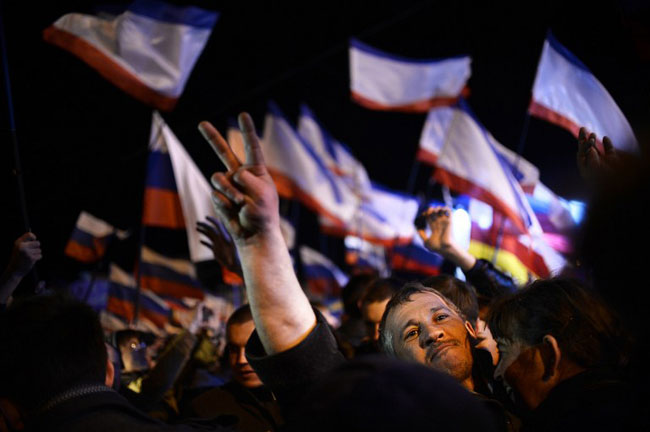
Russia Can Play With Several Options After Crimea Plebiscite
Publication: Eurasia Daily Monitor Volume: 11 Issue: 50
By:

The Crimean plebiscite on March 16 was pre-determined—indeed, pre-rigged—to endorse Crimea’s accession to Russia, following Russia’s military occupation of this autonomous republic in Ukraine (see EDM, March 4, 14).
The two questions on the plebiscite ballot were: 1.) Are you in favor of Crimea’s reunification with Russia as a constituent part of the Russian Federation? or 2.) Are you in favor of restoring the Republic of Crimea’s 1992 constitution, with Crimea’s status as a part of Ukraine? Crimea’s de facto leadership and Moscow campaigned heavily in favor of the first option, clearly pre-judging the plebiscite’s outcome. Notably, the option of some “independent” statehood was from the outset excluded.
But this does not necessarily mean that Moscow will hasten to consummate an unvarnished annexation of Crimea. Russia is strongly placed to temporize and consider options for Russian rule de facto, short of outright annexation, alongside the frontrunner option of incorporating Crimea into the Russian Federation.
Each of the available options presents a mix of advantages and disadvantages to Russia. The Kremlin must calculate which course of action in Crimea would most effectively advance Russia’s political objectives in Ukraine as a whole. Moscow’s central objective is to gain acceptance as an arbiter of Ukraine’s internal constitutional arrangements. Russia must also sound out whether a slight opening toward a negotiated solution on Crimea might dilute the Western sanctions that a blatantly unilateral Russian “solution” is about to trigger.
At this point, Western sanctions threaten to roll forward, driven by moral indignation. Russia knows from experience that such sentiments can be short-lived (they lasted barely one year after Russia’s 2008 invasion of Georgia). In the wake of Crimea, any meaningful Western sanctions would have to be introduced and reliably institutionalized now, before the moral-political momentum dissipates.
Moscow, presumably aware of that, might try to avoid presenting an immediate case of overt territorial annexation. It could falsely signal some degree of Russian “flexibility” by leaving the status of Crimea un-clarified, or having it “deferred,” pending eventual determination through negotiations. If Moscow decides to signal, however falsely, that it considers a negotiated status for Crimea, it would need to do so immediately, only to backtrack cynically after a suitable interval.
Russia can easily afford to wait for some months before fully “legislating” Crimea’s incorporation or some other, fig-leaf status for the territory. Moscow can use the March 16 plebiscite as a basis for ruling Crimea de facto, at the same time maintaining some ambiguity about the ultimate political and legal solution. Such ambiguity would also serve Russia to manipulate with the Crimea issue in Ukraine’s domestic politics.
The Kremlin has already set the “legal” stage for pursuing a flexible approach in the wake of the Crimean plebiscite. Presiding as it does over a lawless state, Russia’s leadership attaches a great deal of importance to the outward appearance of punctilious legality.
The Russian Federation has constitutional and legal procedures in place on accepting territories into the Russian Federation as new constituent entities. The procedures authorize incorporating a territory from another sovereign state, pursuant to the expression of those inhabitants’ will, and subject to the consent of the sovereign state affected, under inter-state agreements (Interfax, March 11, 16).
In the case at hand, however, no Ukrainian government of any color would consent to ceding Crimea (or any territory). To circumvent this legal hurdle, the Spravedlivaya Rossiya (A Just Russia) party recently submitted amendments in the Russian parliament to eliminate the requirement for the foreign sovereign state’s consent. This “simplified procedure,” if adopted, would “legally” authorize Russia to incorporate a territory from another state into Russia on the basis of a referendum in that territory, or an address from that territory’s local authorities requesting accession to Russia.
The Kremlin, however, has temporarily postponed action on these amendments in the parliamentary committees (Interfax, February 27, March 6; Rossiiskaya Gazeta, March 11).
On March 11, moreover, the Crimean parliament adopted a “declaration of independence” clearly designed to delay the implementation of the plebiscite’s outcome. Paradoxically, the vote “to become a part of the Russian Federation” is, instead, resulting in the creation of an “independent and sovereign state” of Crimea, which would then initiate procedures for its accession to the Russian Federation. The “declaration of independence” describes this as a temporary status, pending a negotiated accession. Russia’s Ministry of Foreign Affairs instantly issued a statement characterizing the “independence declaration” as legally valid (Interfax, March 11).
In practice, this declaration has introduced “independence” as a third option: not on the plebiscite’s ballot, but rather for post-plebiscite political-diplomatic maneuvering by Russia. Undoubtedly, Moscow dictated the addition of the “independence” option. “Accepting” an “independent state” into Russia would be presented as less brazen than seizing a part of another state’s territory and annexing it without a half-decent interval and pseudo-legal cover.
Crimea’s new, Moscow-installed leaders anticipate a “transitional period” of six months to one year for consummating Crimea’s accession to the Russian Federation as a federal republic (Interfax, March 16, 17).
Crimea’s “independence” broadens Moscow’s options to play with during the post-plebiscite period. The Kremlin will be able either to precipitate Crimea’s accession or to drag it out, taking into account international reactions and Ukraine’s internal situation. “Negotiating” the terms of Crimea’s accession allows time and space for Russia to maneuver. It can define the scope, pace, and technicalities of the annexation process, seeking to leverage its flexible options against Ukraine and the West.




